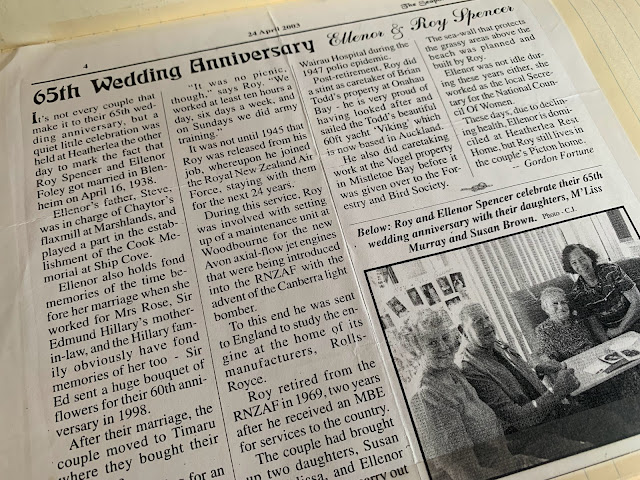It's like an altered fairytale. Some weird alternate universe where instead of the frog turning into the prince, the prince has turned into the frog!
I wasn't going to write anymore about Harry and Meghan. The frustration with all of this is the ability to see the behaviour and have no power to do anything about it. But I changed my mind last night after watching his interview with Tom Bradby because while I have been firmly on the side of the King and the Prince of Wales, and I still am, last night while listening to Harry's own words, a small smidgen of sympathy for him began to creep in. For weeks I have felt anger at his behaviour, at his unfair attacks on his family, our royal family, our late beloved Queen, anger at his selfish, gauche, un-princely actions, but last night that changed as I listened to him speak.
It was a minute, tiny moment that showed me what I think is going on here. So tiny, that unless you know what it is to be in this place, you would miss it. It was a moment of recognition, a fleeting pulling back of the curtain, a shared-experience moment. A moment of empathy. I will get into that, but first I have to lay the foundation of what I want to say.
The account of his experiences around the death of his mother, Princes Diana, is truly moving and as an 11 year old boy the trauma of that altered the course of his life. I understand what trauma does to children, because I have seen it in my own children when they watched their father essentially 'die' before their eyes with his cardiac arrest - he survived, but a traumatic event in a child's life is irreversible in the damage it does. No matter how much you try and protect your children from the harsh realities of the world, sometimes events are out of your control as it was with William and Harry experiencing the death and loss of their mother. William, because he was older, was able to cope better. This is not minimising his experiences at all, but rather putting into perspective how time and age and maturity makes a huge difference to internal emotional development. My eldest child at 17 years old coped better with his father's cardiac event than my youngest child at 9 years old, and this is purely due to the age and maturity factor. Prince Harry's development was arrested and altered at the age of eleven upon experiencing the loss of his mother and he probably did not receive the help he needed. This is not anyone's fault - therapy in those days was not seen as important or as accessible as it is now, there have been huge developments in psychology over the 25 years since Princess Diana's death.
So, I start with this as a baseline. This is an explanation for his behaviour now. This is why he sees killing Afganistan soldiers as 'chess pieces' and not as humans. This is why he says he 'couldn't cry' at his mother's death. This is why he always thinks the world is against him. This is why his behaviour and words are seen as childish. It's not because he's a raging psychopath - though these traits can be characteristic of psychopathic behaviour, I personally don't think he is, but because he has arrested development due to childhood trauma. There is perhaps another diagnosis, but I am not going to go there.
My own sympathy began to creep in for Harry while watching the interviews because while taking this all into consideration, the tragedy of Harry's life - the sadness of Harry's life, is something that is all too familiar to me. I recognise the hallmarks of it. I feel the blinding loyalty that comes with it. I cower remembering the hurtful, lonely place that this is. I remember in ways I don't want to remember. It's a visceral, devastating place to be.
I also know what it's like to be the pawn, the victim, the toy of the narcissist.
I know what this is like and I see it in Harry.
This is why I can find some pity for him, in my heart.
This is also why I think, surmise, guess - that the Royal family are trying to leave a crack open in the door. I think they understand, on a deeper level than the media and the general public do what is really going on, and they know that one day they'll need to be there for Harry. To love him, to give him a place to go back to when the bottom drops out from under his world as it ultimately will.

I posted this picture on my Instagram last week as we were drip-fed excerpts from his early-released book, 'Spare.' Harry claims to love his family, but everything this verse says, Harry has been doing the opposite of. Why? Perhaps, as I see it, because he is in the grip of a narcissist and he cannot see anything else, or any other perspective. This was excruciatingly revealed in the story of his argument with Prince William after their grandfather's funeral, where William is seemingly desperately trying to get through to Harry, and Harry chooses to not believe him. This is what a narcissist does - blinds you so much to outside perspectives, pulls you in so much so that all you can see is the narrative being fed to you. When I was with my narcissist, friends also tried to get through to me, expressed worry about me. It didn't work. My default was to defend the narcissist.
What I took away from the interviews is that Harry is telling himself - making it his 'life work' to bring accountability to the press, to the media. He kept on and on about it - to the point that at times he wasn't making much sense and you could literally see the frustration on Tom Bradby's face.
So what is going on here? Is Harry really that concerned with negative stories about himself and his family in the media; ie, Meghan and the children, and the stories not being corrected by the Palace?
I don't think so. In my experience of life with narcissism, my opinion would be that this is the narrative that he is telling himself, trying to desperately convince himself, prove to himself that it is the media, the press, the journalists that are all at fault here - but I believe he is projecting because he knows deep down that the real issue here is his wife and he doesn't want to believe it. He doesn't want to see it. He doesn't want his brother and his father to be right. His intuition is telling him and he's not listening.
I saw it. I saw it in that tiny, minute fleeting nano-second.
It's almost like that saying, 'he doth protest too much.'
If you go back through the interview and exchange every mention of the British Press or media etc with his wife's name, it puts a whole different perspective on it. Now, of course he is not going to do that. He is still deeply entrenched in the narrative that is being told to him. At the moment his current way of life depends on him believing this and he still wants to believe the best of his wife because he is still in love with her. He tells himself (and the world) that he is the happiest he's ever been, but happy men don't go on television and trash their family.
I noticed that he was fighting against emotions when he was talking about how he used to hope that he and William and Kate and 'whoever' he married would get on well and work together. He held this dream. We have seen him when it was just the three of them - yes he was sometimes the third wheel - but his brother and sister-in-law seemed to include him happily and have a good time with him. He wanted this. He wanted this dream future. He wanted a partner that everyone would love and get on with. He wanted the fairytale. But it didn't go as well as he had hoped and it hurts him.
Narcissism is an evil beast. It is cruel and relentless. It destroys families. It's abuse turns you into a shadow of your former self. It makes you paranoid. It makes you believe lies. It makes you see others as the enemy.
It makes you sacrifice yourself to protect the narcissist.
Is there any hope for Harry?
The only hope lies in his family back in the UK.
Eventually, he will either come to a realisation and admit to himself that he has been groomed and used by a narcissist (I believe this is unlikely, but I did see a glimmer of hope in that interview).
Someone could potentially get through to him and like a leaking tap, keep drip, drip, drip with love and reminders of who he is and who he could be. A good therapist would do this - this was how it worked for me, but often it is a close friend just keeping at it and not giving up. In Harry's case, this seems unlikely because his close friends have been isolated and he views them with distrust.
Finally, the narcissist will eventually move on. This is inevitable.
Why do I think the only hope lies in his family back in the UK? Because they know the real story of what went on before. They know Harry and they love Harry genuinely, authentically, not as a narcissist loves.
They have been the true definition of I Corinthians 13 and this is why King Charles is reluctant to cut all ties with his younger son. He loves as a father should love, unconditionally, with forgiveness and in the end, Harry will need this to repair his life.
Opinions expressed in this post are my own.





















